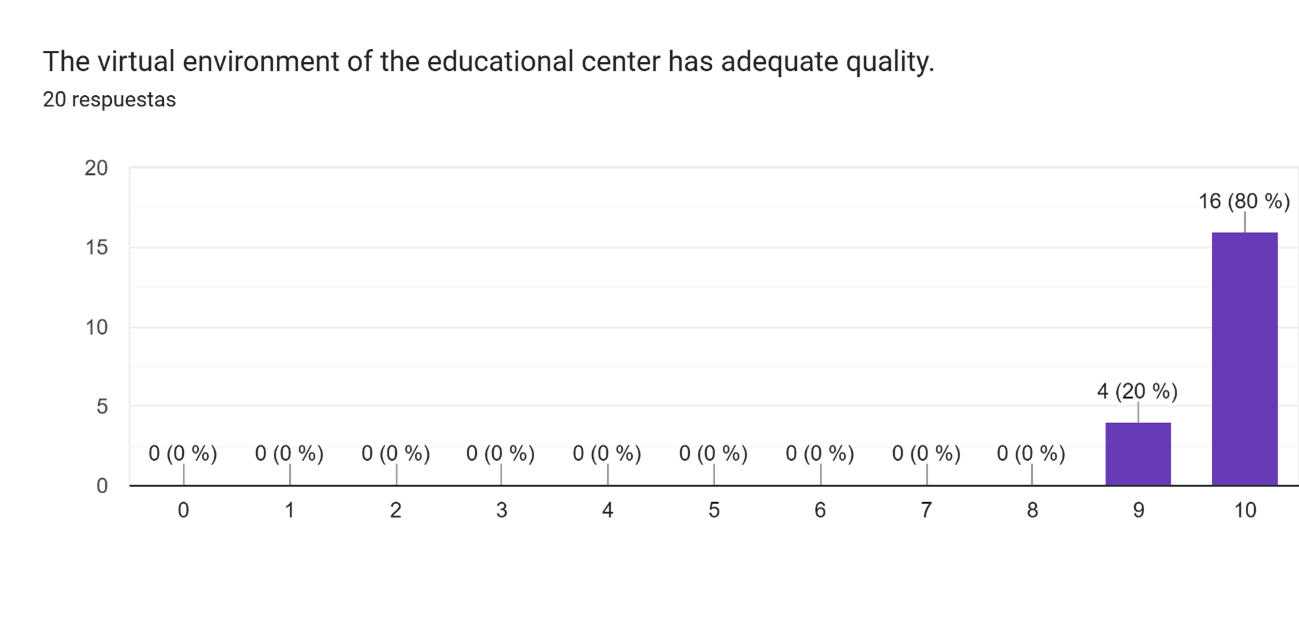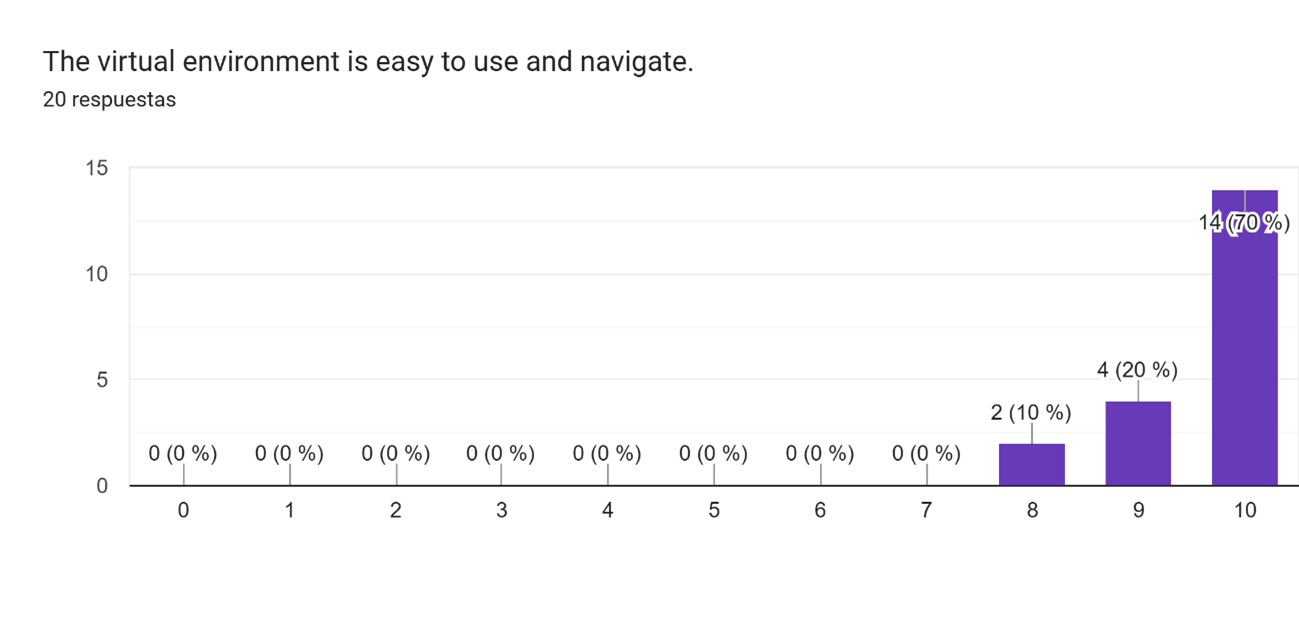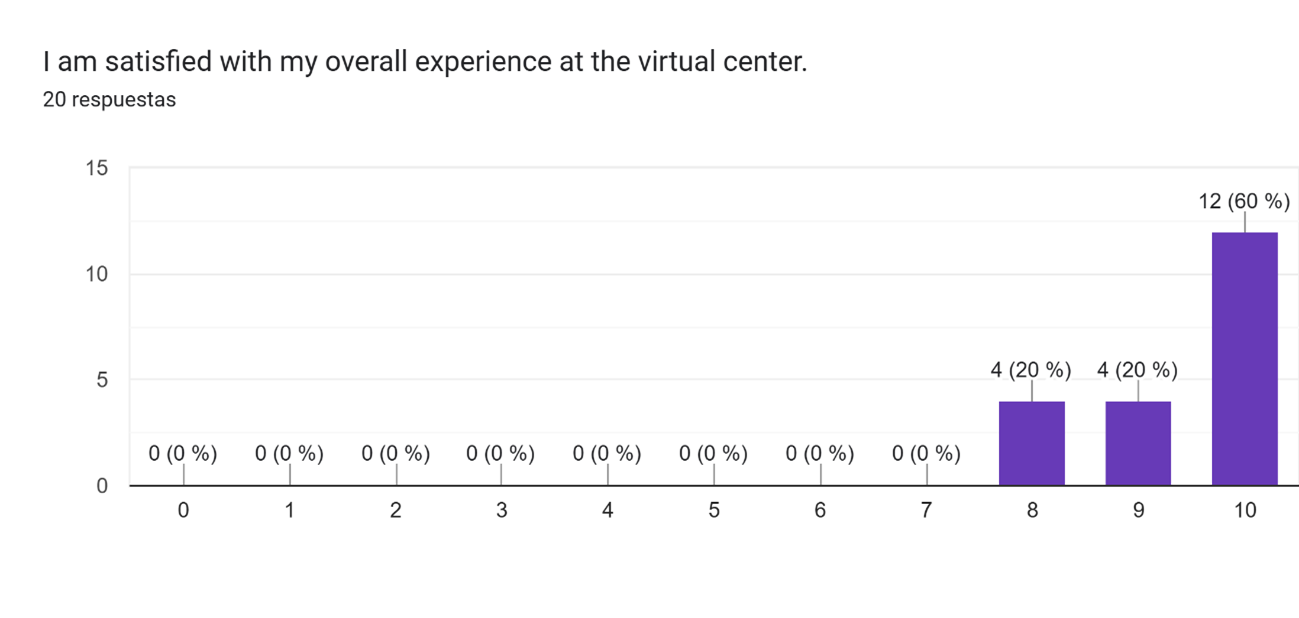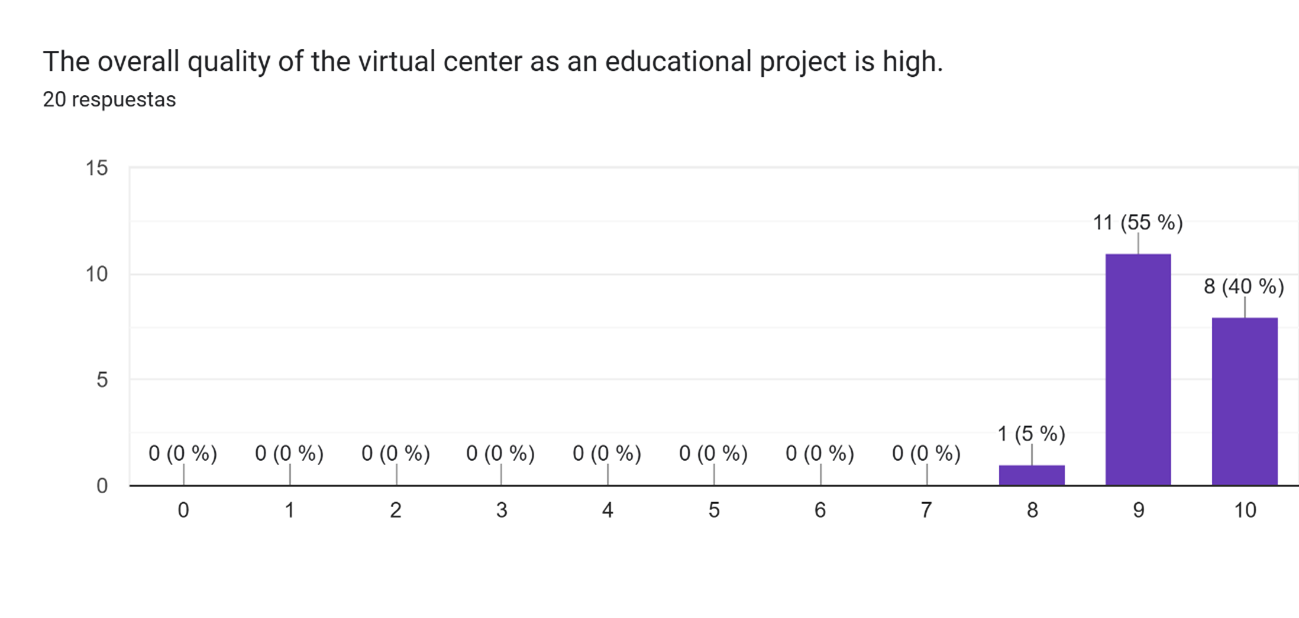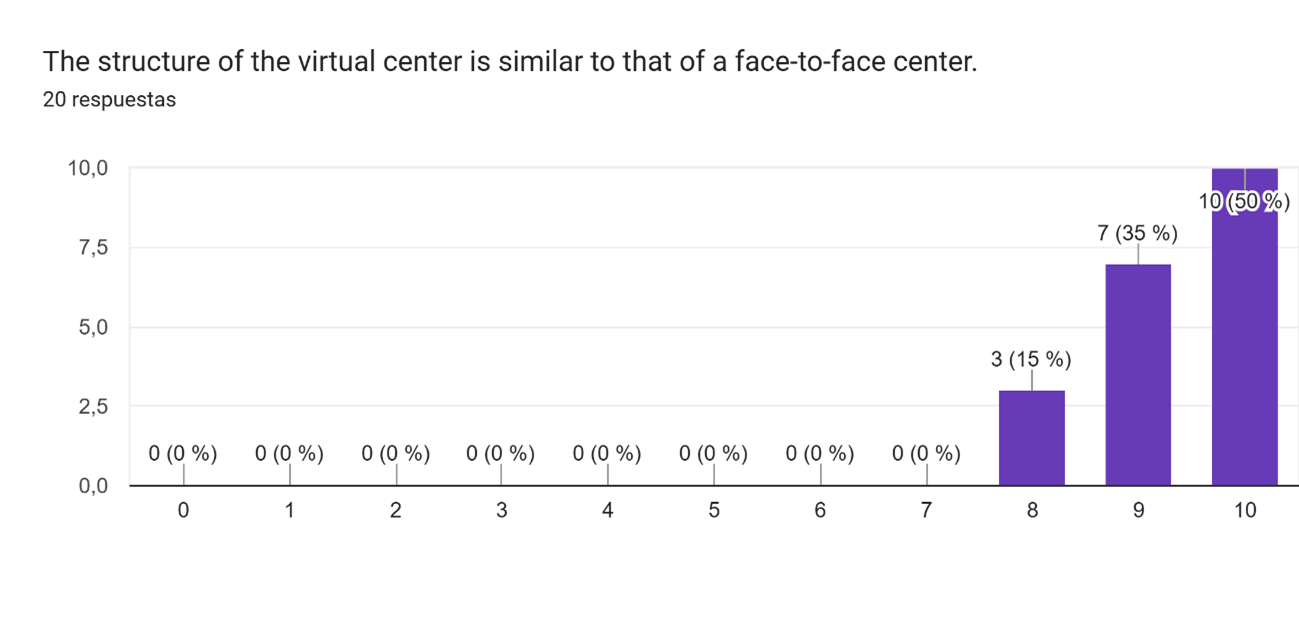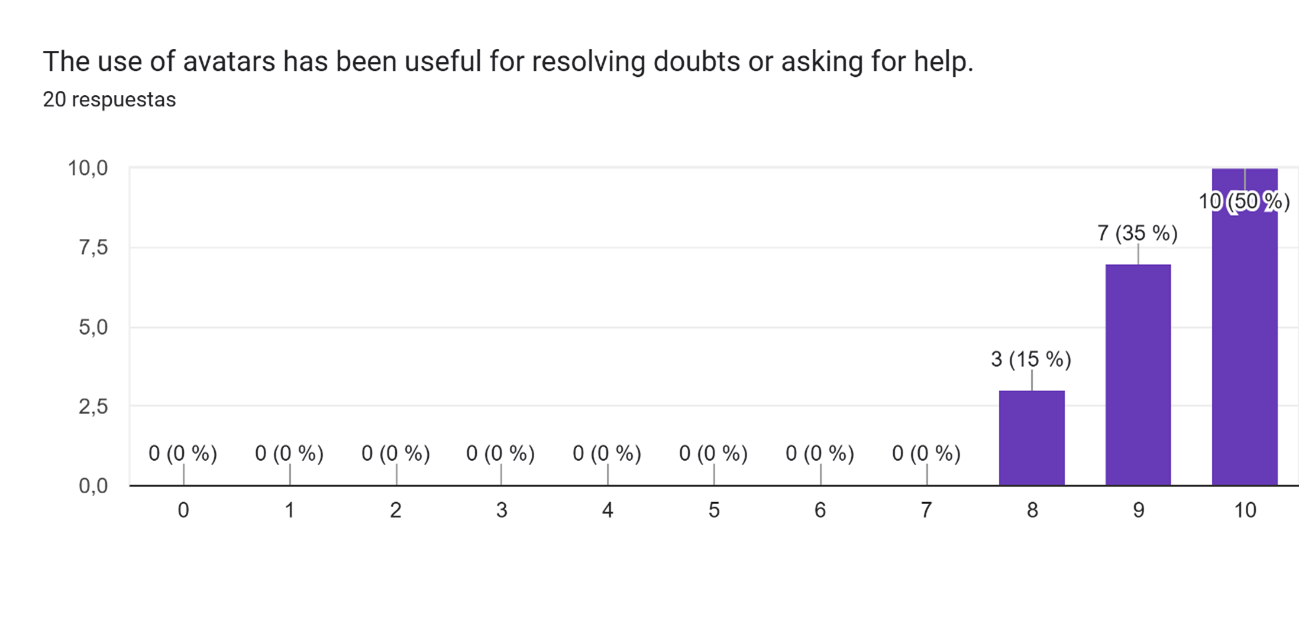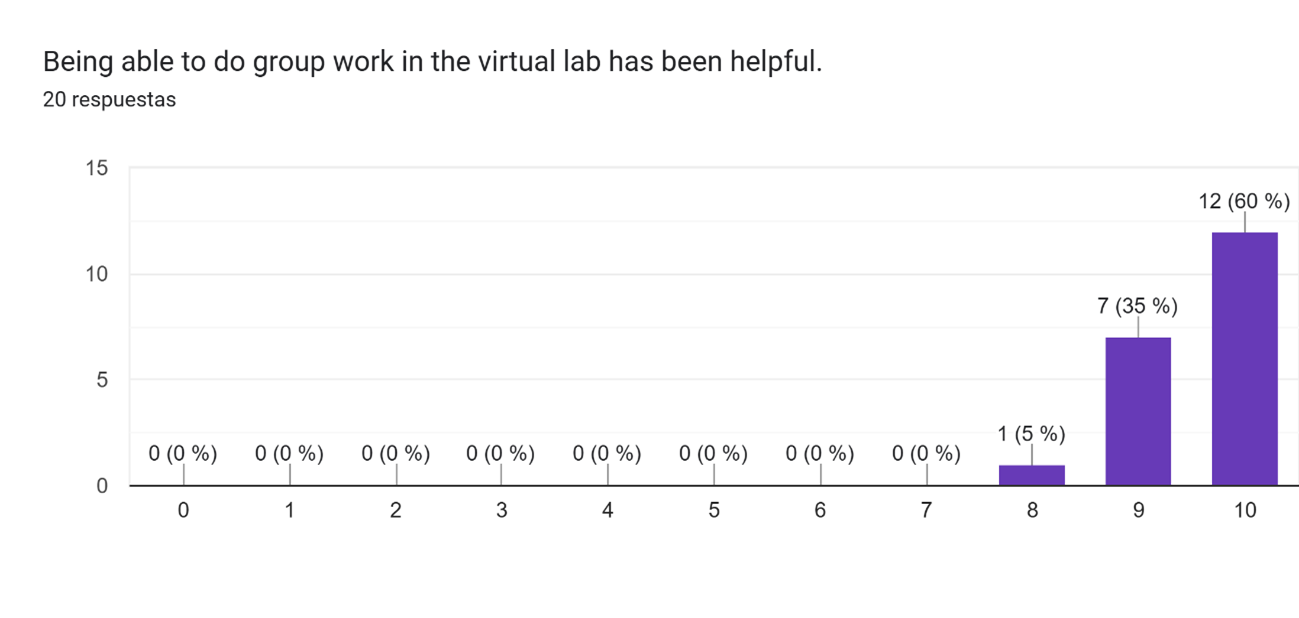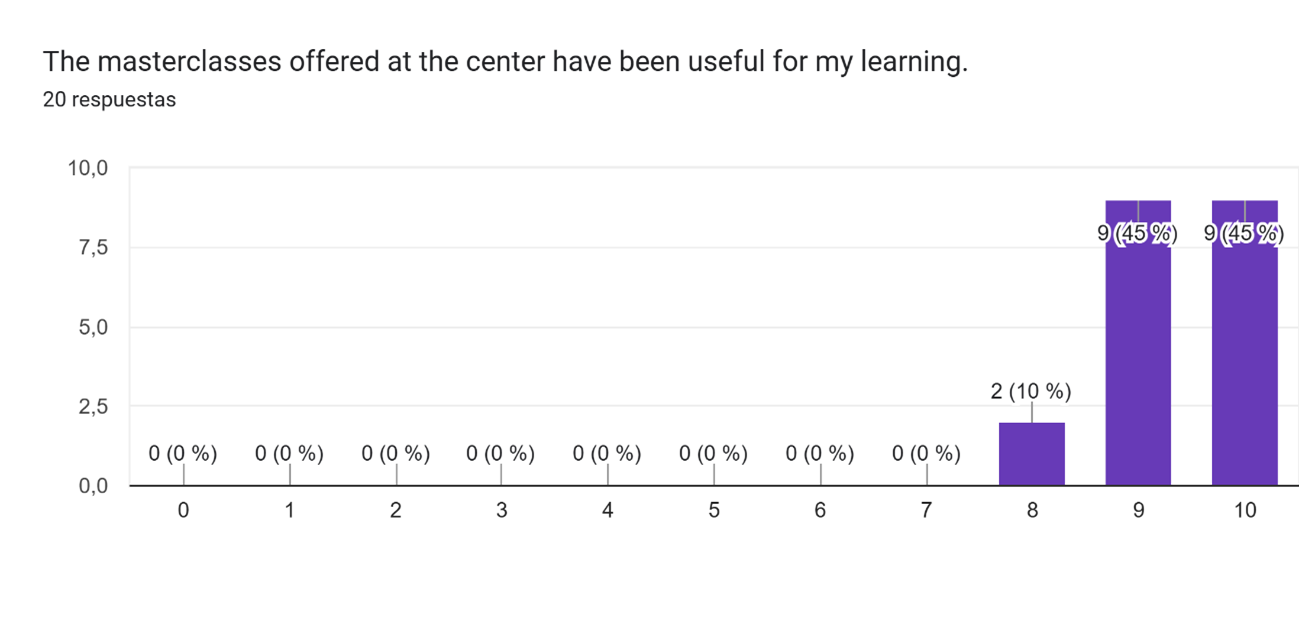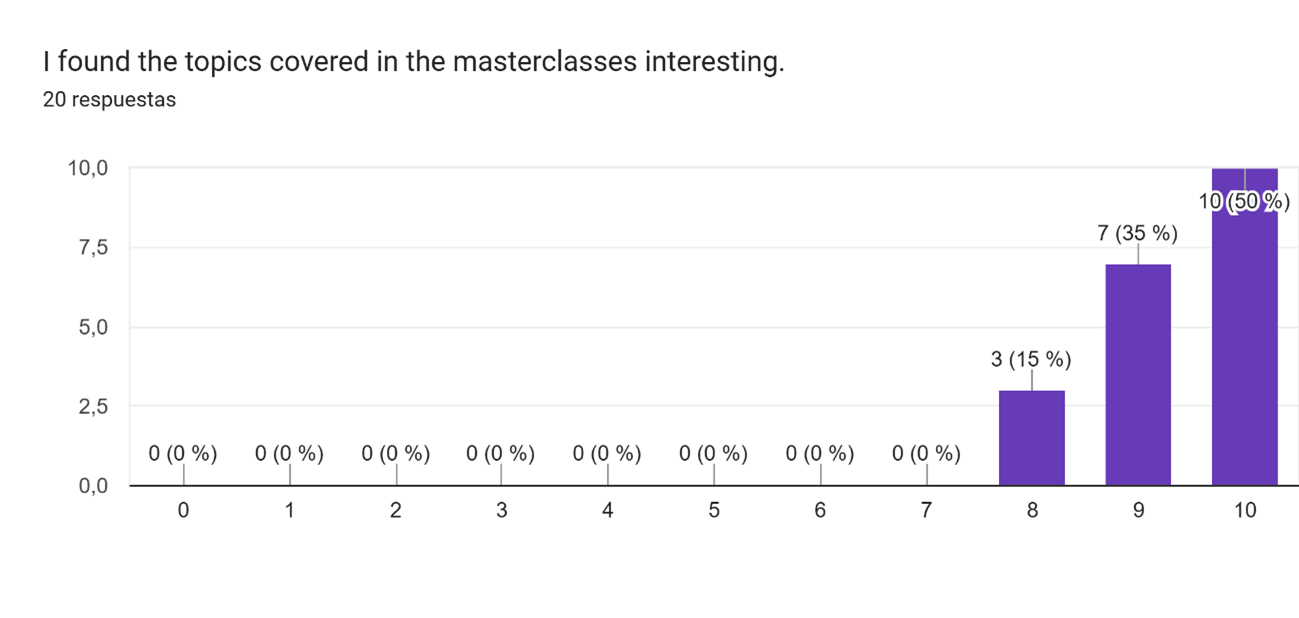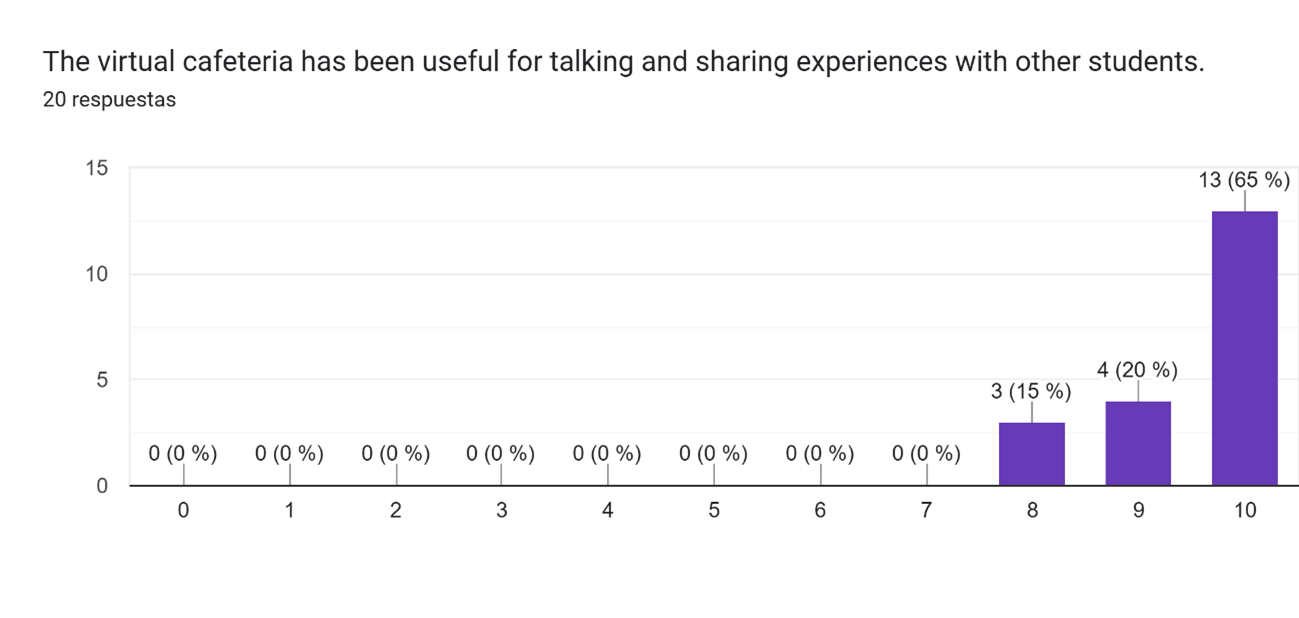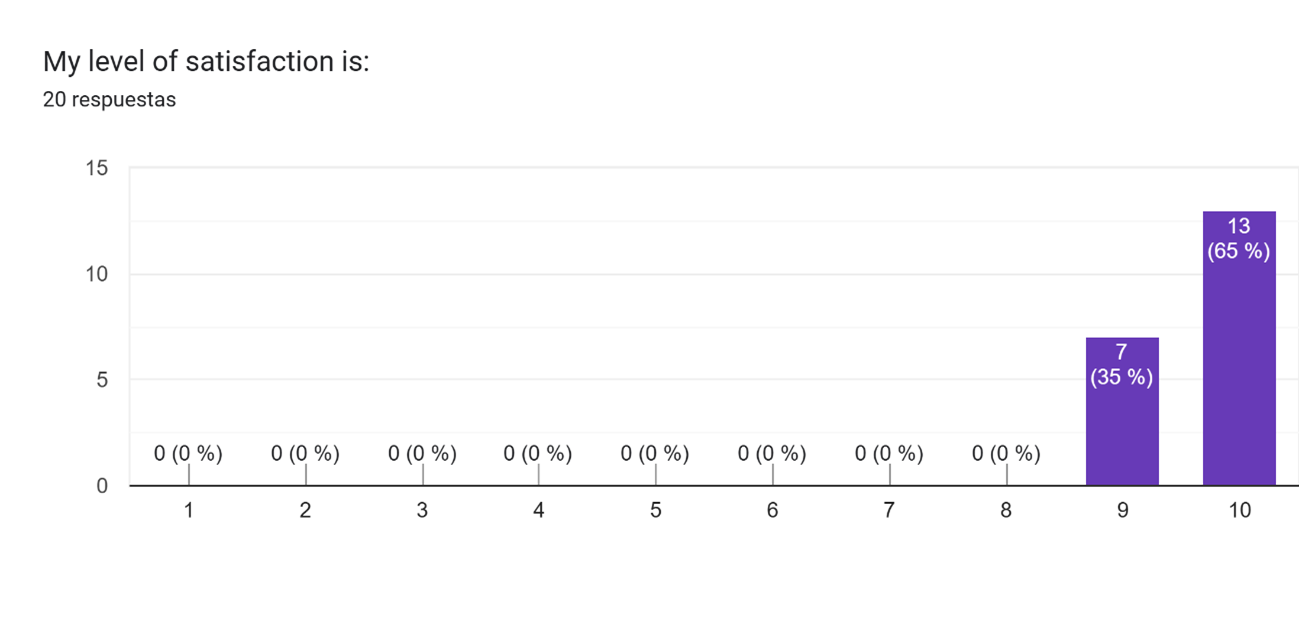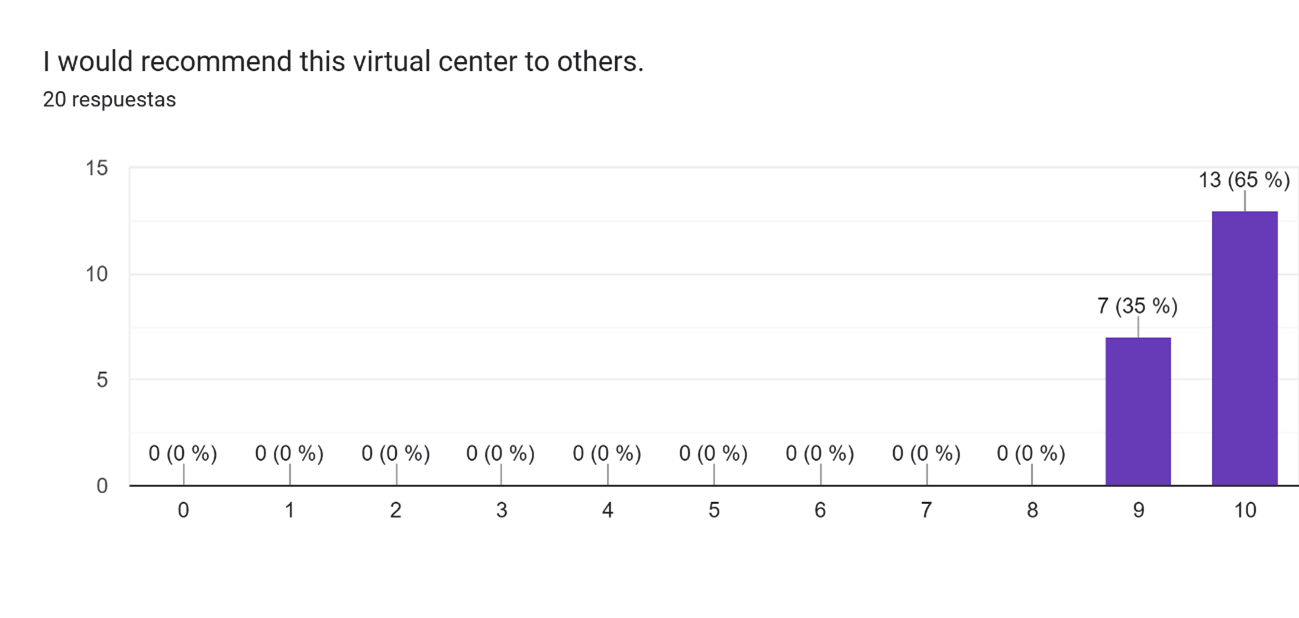The pilot tests were developed to evaluate both the effectiveness of the E2.0C methodological strategy and its feasibility, as the reason for its need is clear: a traditional adult education model does not effectively address the challenges faced by people with multiple barriers. This is a consequence of an overly rigid educational model that neither connects with the social realities of many people nor generally considers the use of new information society technologies to offer effective solutions. Without a doubt, the inclusive digital approach of the E2.0C strategy, aimed at employment in the third sector, transforms the opportunities for social and labor integration for adults with obstacles.
The results obtained in the pilot tests not only demonstrate this premise but also help us gather information to refine the results if necessary.
PILOT TEST O1. DIGITAL PLATFORM
The virtual learning platform has been the central focus of the pilot tests. During the platform testing process, 26 members (technicians and managers) from social and third-sector organizations participated. They evaluated not only the quality of the resource but also its usefulness and ease of use for its implementation within their organization and the creation of their own E2.0C center. The tests consisted of analyzing the operating environment template and the Guide: How to Create Your Own E2.0C Center. The test participants evaluated the effectiveness and ease of use of the results for creating an E2.0C center from scratch.
General objective: To evaluate whether the E2.0C virtual platform complies with the educational model for E2.0C centers and is accessible so that any entity wishing to join the E2.0C methodology can create its own E2.0C center for adults with disabilities.
Specific objectives:
- To verify that the operating environment template and the “How to Create Your Own E2.0C Center” Guide contain all the necessary steps and resources and are easy to use so that technicians and entity managers can create their E2.0C center.
- To evaluate the accessibility and ease of use of the operating environment template and the Guide.
Participants: technicians and managers of third sector entities and adult training centers for their ability to implement the result and create E2.0C centers.
Results of the pilot test:
The platform’s evaluation yielded positive and satisfactory results, as the average score of the 26 surveys conducted exceeded 9 out of 10. This resulted in very low standard deviations, ranging from 0.57 to 0.76, demonstrating that respondents are very satisfied with the virtual learning platform due to the homogeneity of their opinions.
The minimum response rate recorded (8 points) demonstrates that users are highly satisfied with the platform, a fact reinforced by the results of the first quartile (around 9 points), indicating that at least 75% of respondents gave it very high scores. The median is generally 10 points—except for the immersive experience and digital resources item, but only with slightly lower scores, between 9 and 9.5 points. The third quartile is always 10, meaning that 25% of respondents gave the items the maximum score. Finally, the maximum score obtained in each aspect evaluated is 10 points, confirming a very favorable perception of the E2.0C virtual platform.



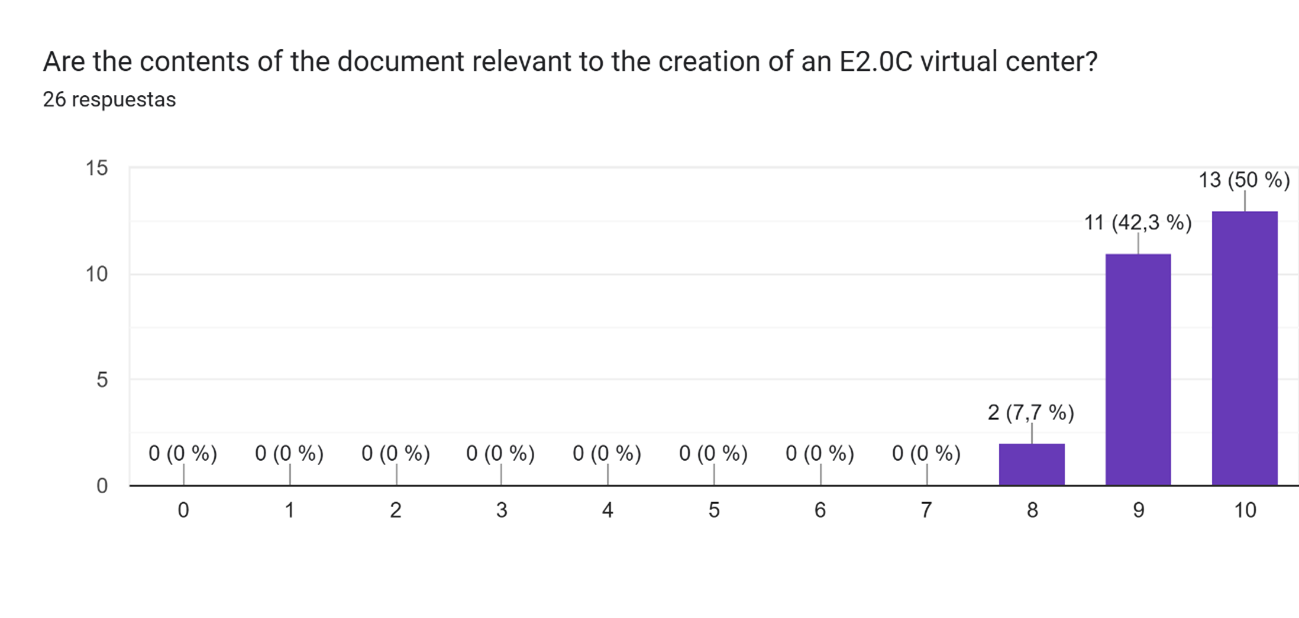

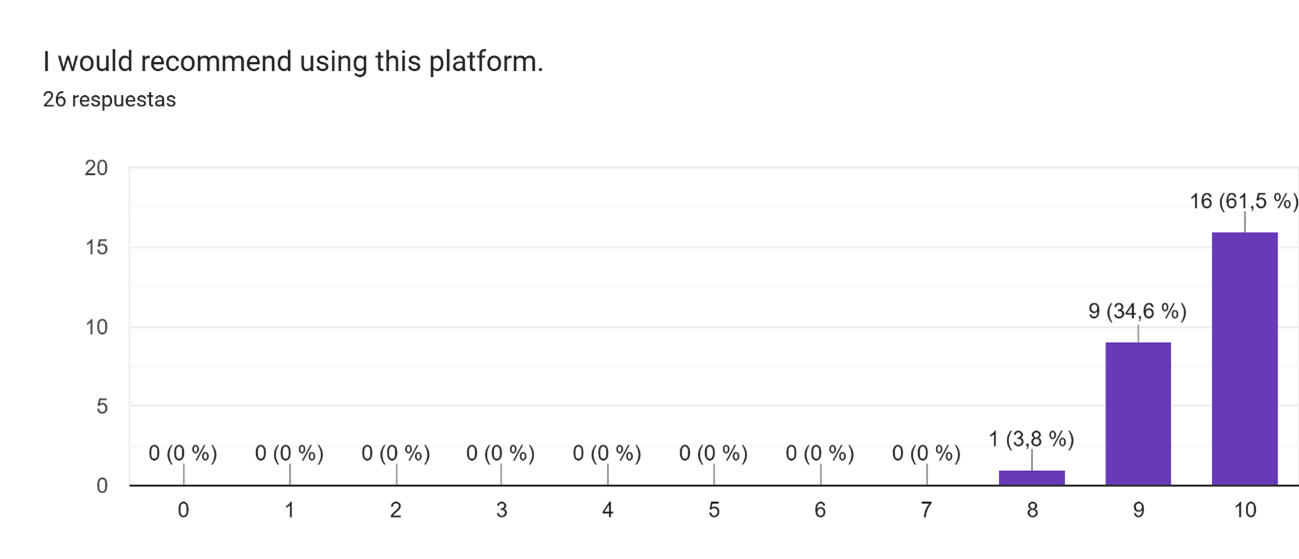
PILOT TEST O2. CENTER´S EDUCATIONAL PROYECT
Thirty teachers from adult education centers and social organizations participated in the pilot tests of the educational project, seeking to structure and develop an adult education model based on the integration of technology and volunteering. The project templates for the other E2.0C centers were also created using the center’s educational project template. The tests consisted of the 30 participating teachers reviewing the document for subsequent analysis. After completing this analysis, they conducted a survey, the results of which were analyzed using Graphpad 8 software to assess the quality of the results and participant satisfaction.
General objective: To evaluate the viability of the methodology and content of the E2.0C center’s educational project, ensuring compliance with the required educational standards and its suitability for the target audience.
Specific objectives:
- To verify that the target audience (i.e., the school’s users) is aligned with the proposed content.
- To evaluate the adequacy of the educational curriculum to the standards of the partner countries and the promotion of European values.
- To demonstrate that teachers are able to resolve issues related to the platform’s content and interface.
Participants: Trainers and teachers from adult education centers and social organizations interested in implementing educational tools for adults based on technological innovation and with the possibility of volunteering, since they are ideally suited to decide whether it is applicable in a real-life context.
Results of the pilot test:
The evaluation of the E2.0C Center’s Educational Project also yielded satisfactory results, as the average response rate of the 30 surveys conducted exceeded 9.4 points out of 10, resulting in very low standard deviations, between 0.49 and 0.68 points, reflecting a high level of satisfaction.
The lowest response rate (8 points) demonstrates that even the least satisfied respondents maintain a positive perception of the project. This is further reinforced by the first quartile results, between 9 and 10 points, indicating that at least 75% of participants give the educational project particularly high scores. The median score for all items evaluated is 10 points, confirming that more than half of the respondents gave the maximum score for each aspect of the project. Finally, the maximum score recorded in all aspects evaluated was 10 points, corroborating a clearly favorable perception: in short, the E2.0C center’s educational project has obtained excellent ratings, showing high satisfaction and exceeding its average score of 9.4 out of 10 in all items.


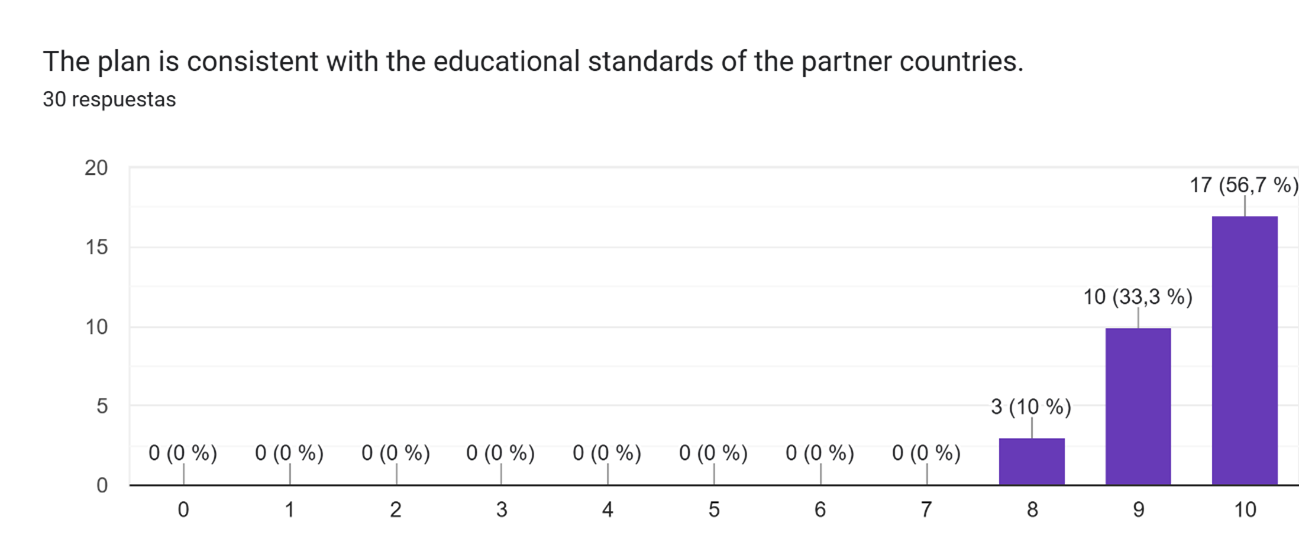
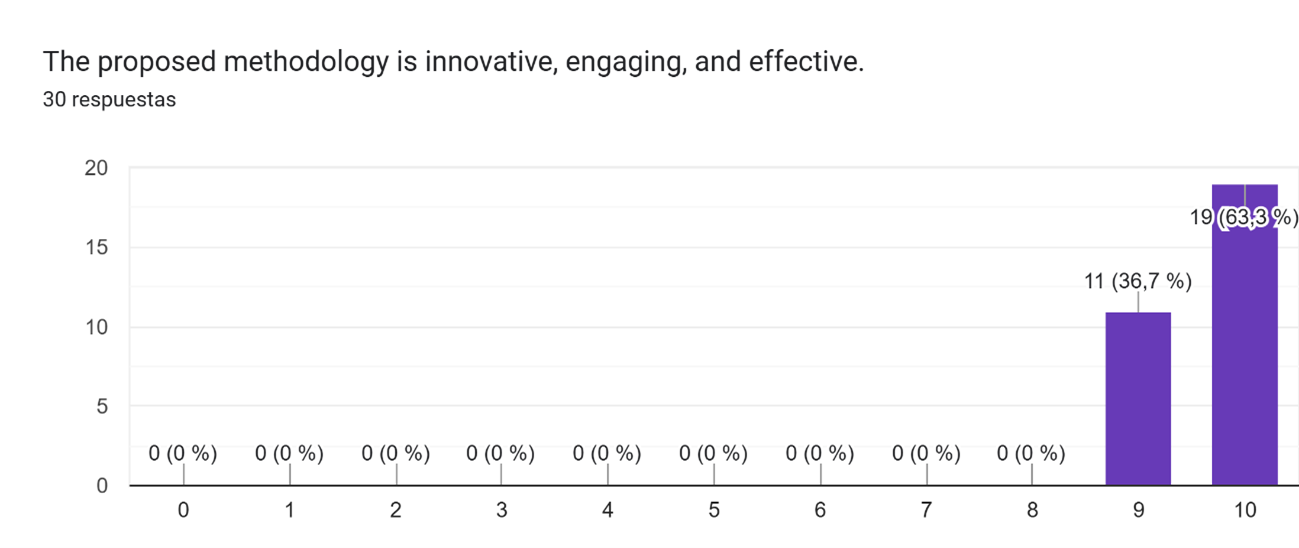
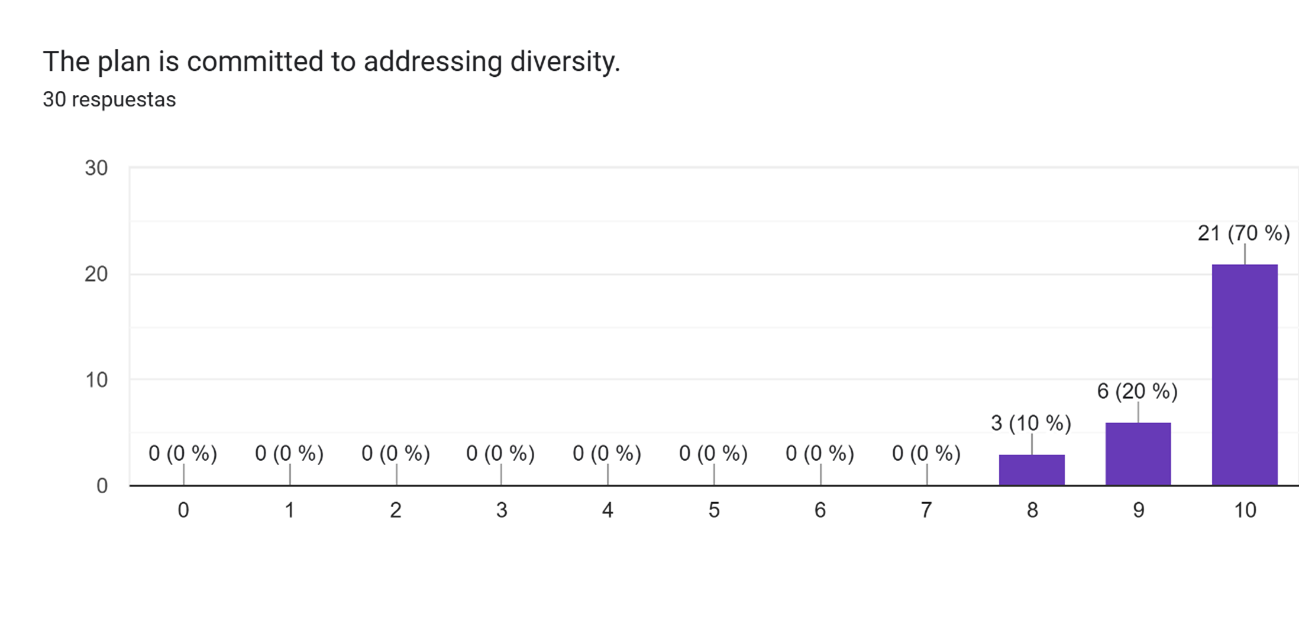
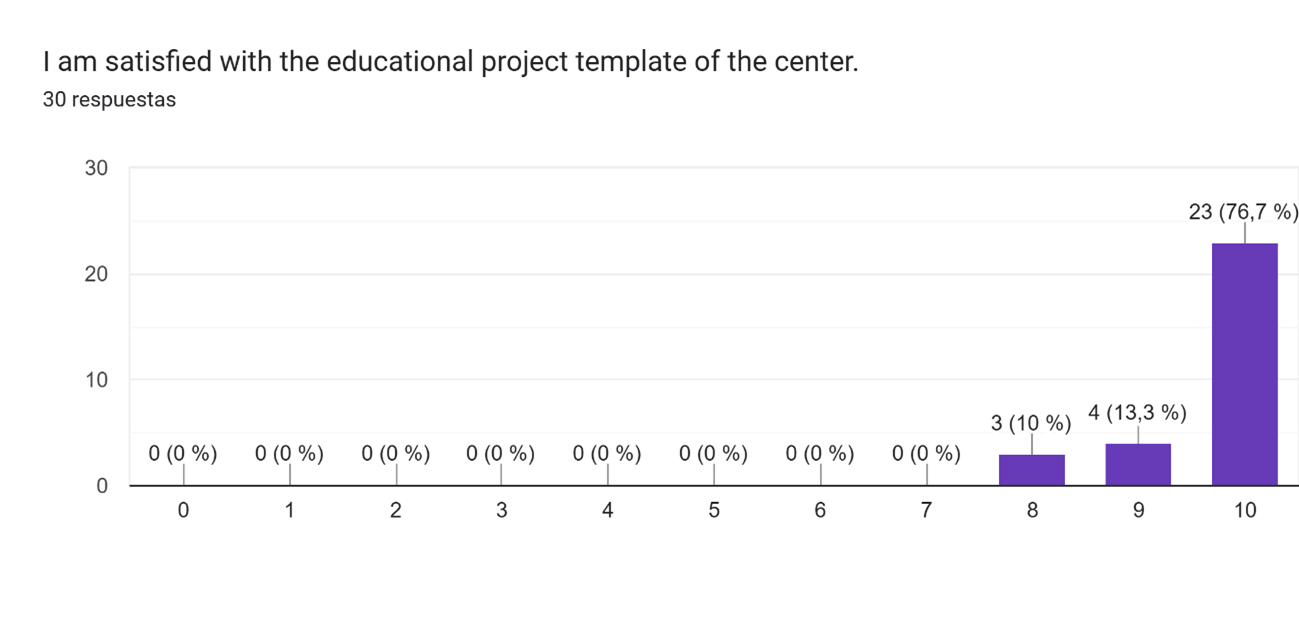
PILOT TEST O3. COURSE FOR THE INCLUSION OF ADULTS WITH OBSTACLES
We conducted a pilot test with two groups of participants, each consisting of 20 people: a control group, who completed the survey without having taken the course, and an evaluation group, who participated in the course and evaluated it. This test allowed us to conclude that the course had a positive impact on the participants, as the group that took the training obtained significantly higher scores compared to the control group.
The total duration of these pilot tests was 8 months.
General objective: To corroborate the validity of the training course for the inclusion of adults in the third sector (both in terms of digital learning and active volunteering) before its final implementation.
Specific objectives:
- To evaluate the efficiency and effectiveness of the educational content.
- To evaluate the feasibility of mobility.
- To measure the impact of beneficiary participation.
Participants: Adults between the ages of 18 and 54, especially between 18 and 30, who are outside the school system, without a degree, and/or in situations of social exclusion, with the aim of validating the project’s impact in real-life settings.
Results of the pilot test:
A test was conducted with two groups of participants: a control group (who took the survey without having taken the course) and an evaluation group (who participated in the course and evaluated it). The tests consisted of 20 participants taking the course at the Benita Gil E2.0C Educational Center. We then conducted a survey of the 20 participants who had taken the course, the evaluation group, and the 20 adults with disabilities who took the survey without having taken the course, the control group.
We initially conducted a test to verify the distribution of the sample groups (evaluation group and control group), observing that both presented a Gaussian distribution. Based on this verification, we performed a multiple comparisons analysis using a t-test using the Holm-Sidak method. The results showed statistically significant differences in all the questions posed between the control and evaluation groups:
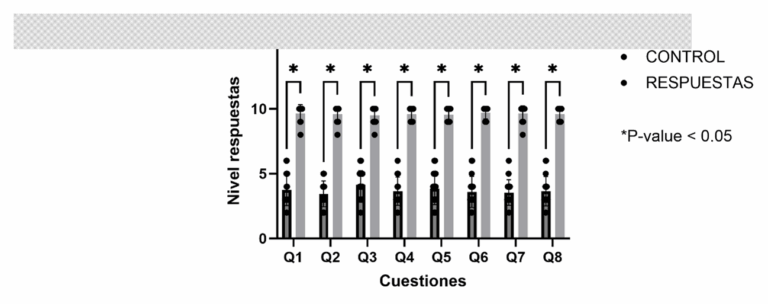
Regarding the surveys conducted by the evaluation group for the adult inclusion course in the third sector, the evaluations also returned highly positive results: the 26 user surveys obtained an average response rate exceeding 9.4 points out of 10 in all cases, even reaching 9.8 points for some items. The standard deviations ranged between 0.45 and 0.71 points, a considerably low score that reflects great consistency in the learning experience results as well as a high level of satisfaction among respondents. The lowest score recorded in the responses was 8 points for participants who appeared least satisfied with certain aspects of the course, while the highest score in all responses also reached 10 points in this section, corroborating the highly favorable and positive perception of the course.
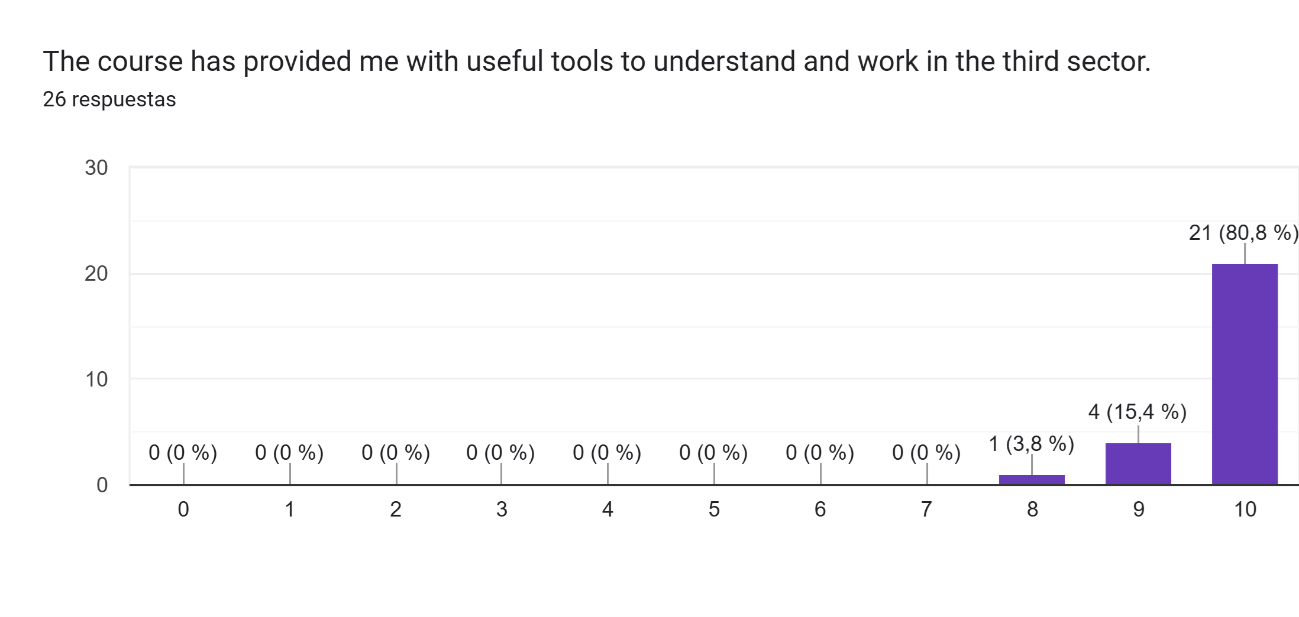
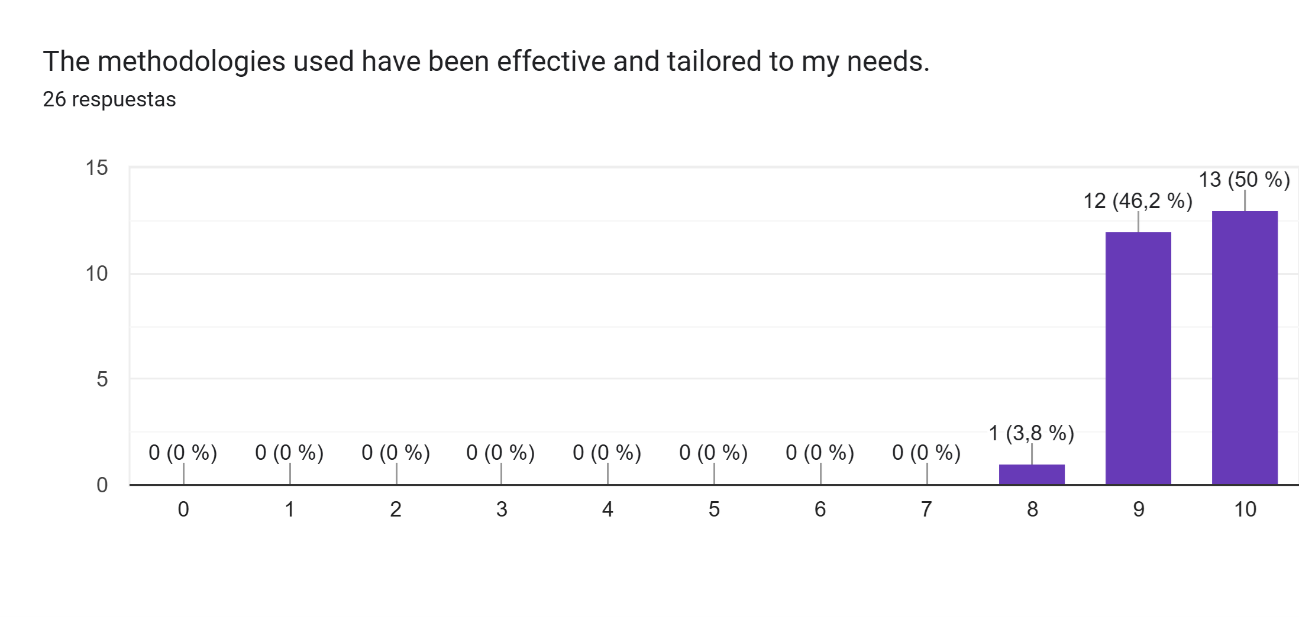
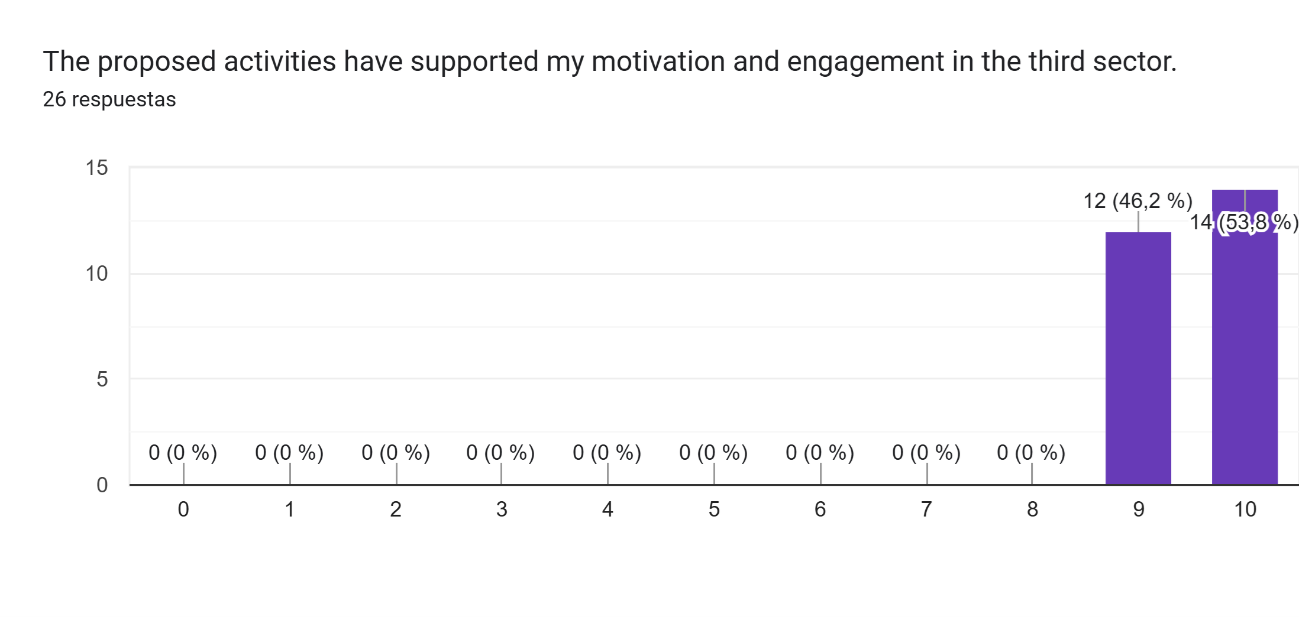
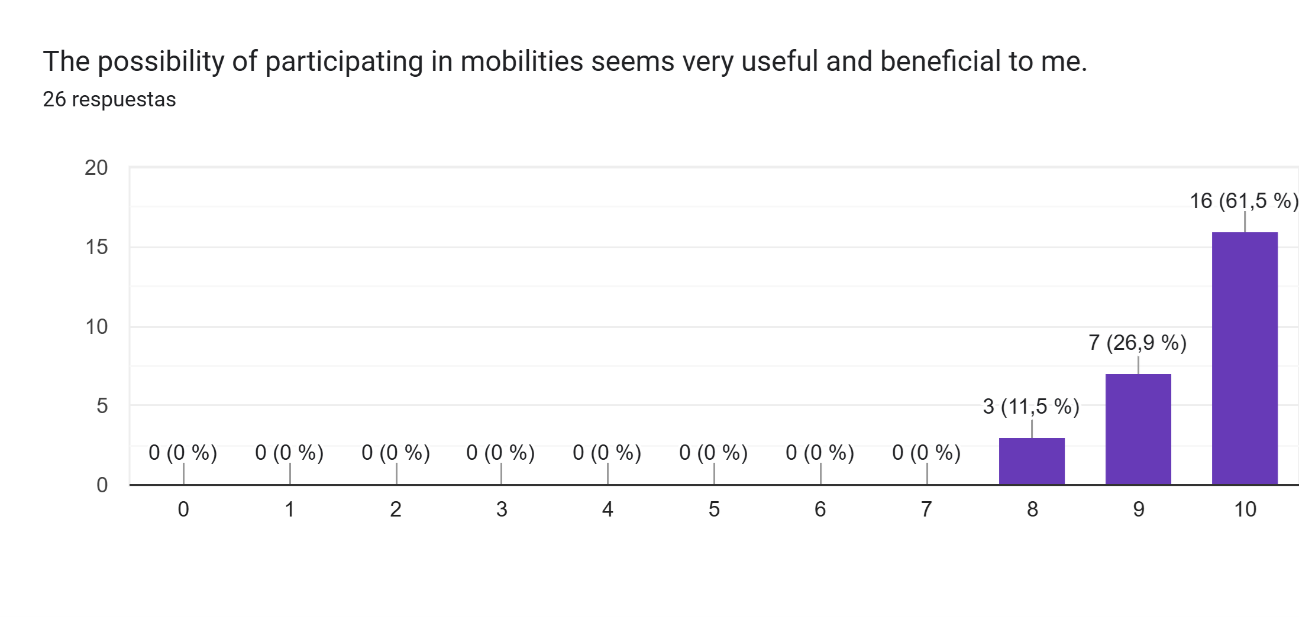
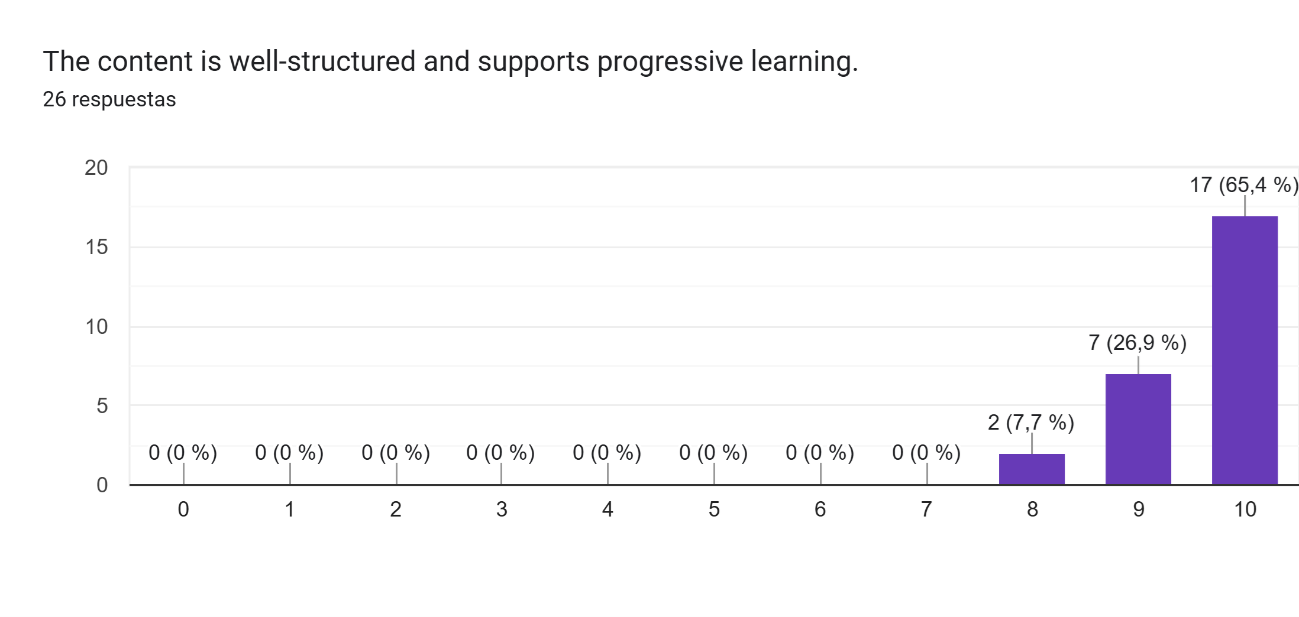
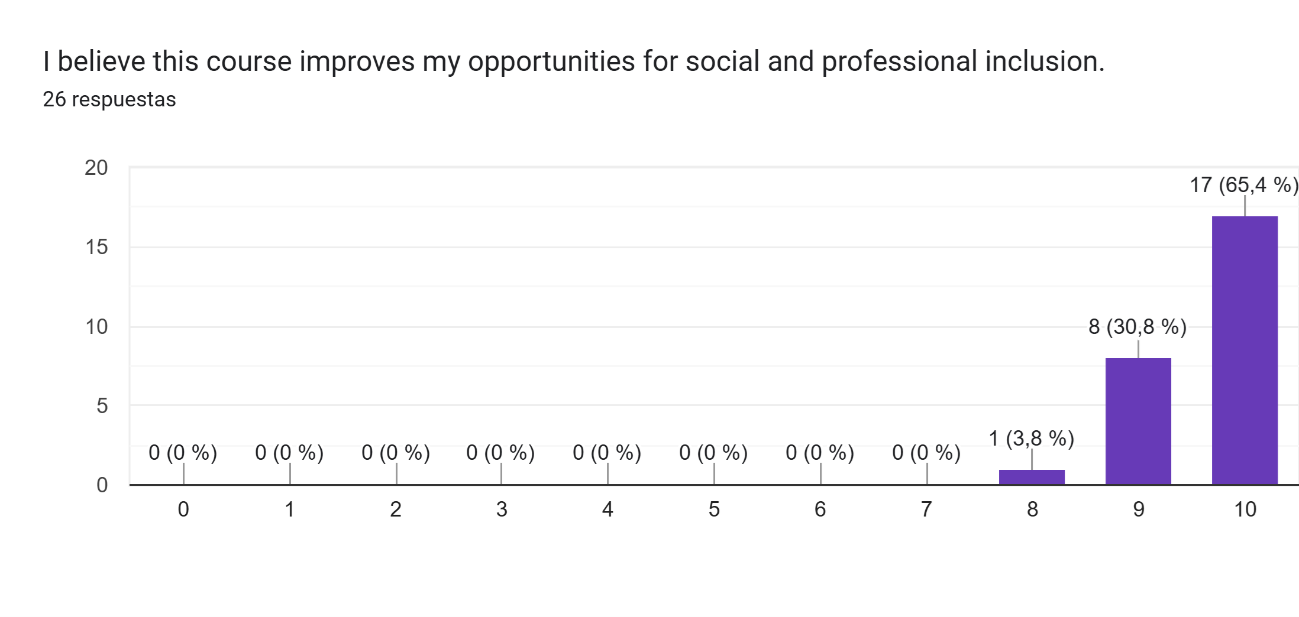
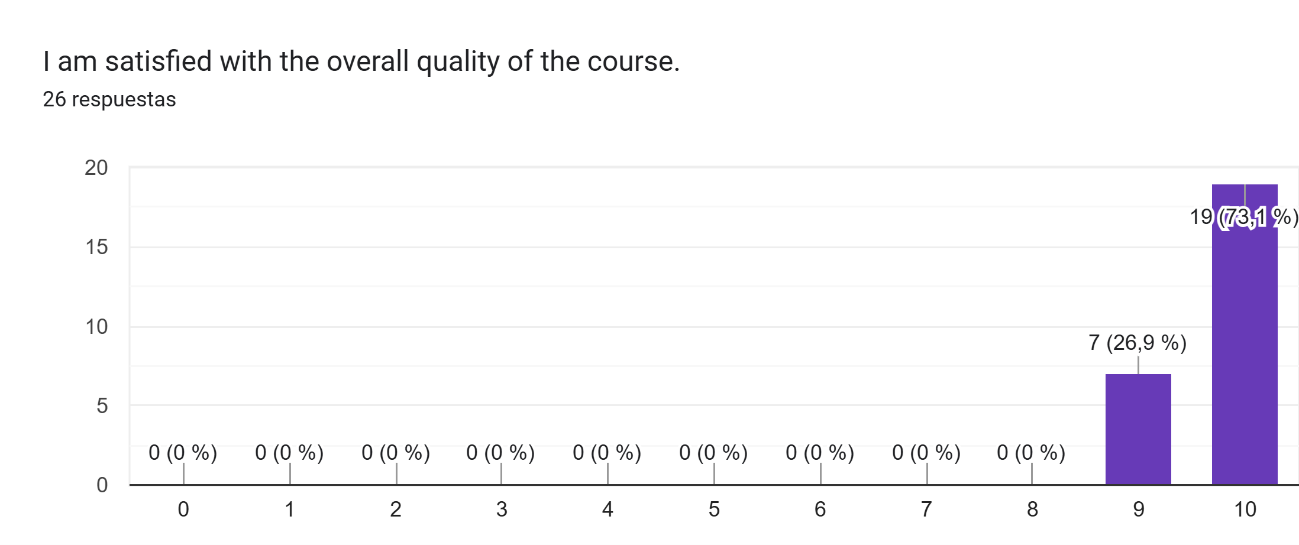
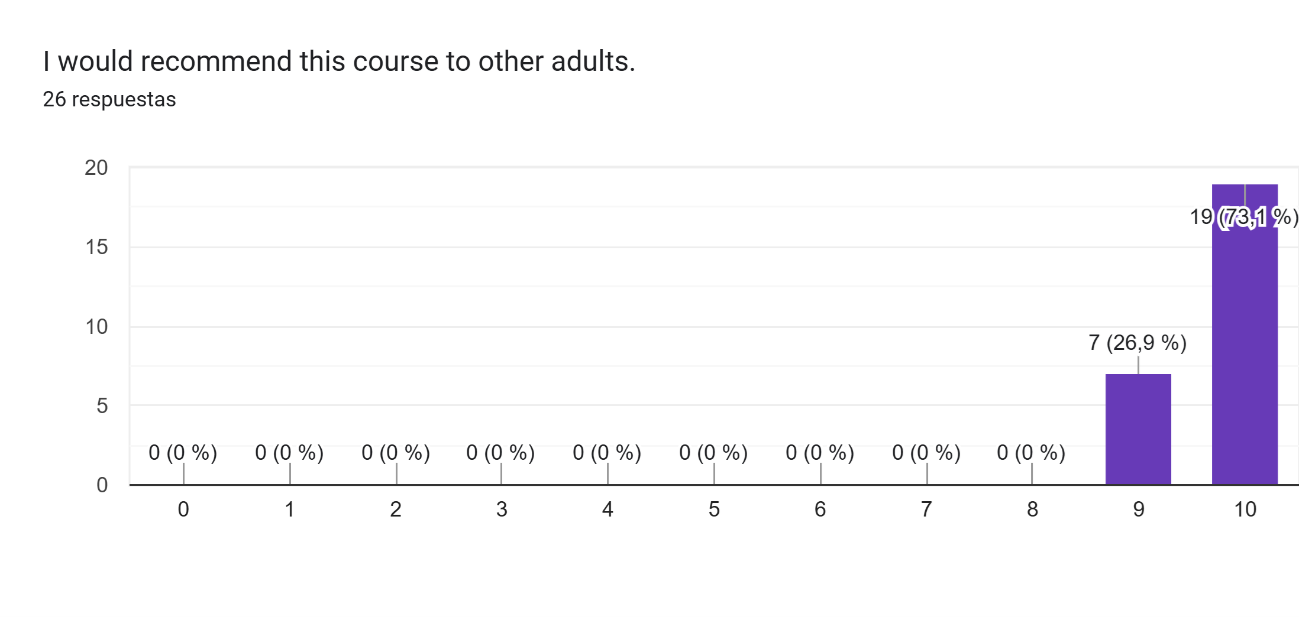
PILOT TEST O4. COURSE FOR TRAINING ADULT TEACHERS THROUGH THE THIRD SECTOR
In November 2023, we conducted an in-person O4 course with 27 technicians and trainers (activity C5 included in WP4). This course served as a pilot test for content validation.
We edited the content in SCORM format, included it in the E2.0C center “Benita Gil,” and conducted a second pilot test with 30 technicians and trainers from Greta du Velay and Lesvos Solidarity, who validated the course’s structure and quality within the platform.
General objective: To corroborate the effectiveness of the course designed to train teachers in the use of innovative digital learning methodologies and active volunteering to educate adults with disabilities before its final implementation.
Specific objectives:
- To assess whether the course allows for the integration of active volunteering principles into teachers’ educational practice, adapting them to the context of adults with disabilities.
- To analyze whether the training provided to teachers throughout the course is effective and tailored to their needs.
Participants: Adult education teachers and trainers interested in the social sector and eager to discover innovative methodologies. Given the project’s purpose, this group is essential to its success and will also serve as a platform for dissemination.
Results of the pilot test:
The evaluation of the course through active volunteering has yielded very positive and satisfactory results. Of the 30 surveys conducted, the average score exceeded 9.4 points out of 10 in all questions, even reaching values close to 9.7 in some specific cases. The standard deviations are remarkably low, between 0.46 and 0.68, demonstrating great homogeneity in opinions and high participant satisfaction with the training. The lowest score recorded in the responses (between 8 and 9 points) shows that even the least satisfied participants maintain a clearly positive perception of the course. The median score for almost all items evaluated is 10 points, confirming that more than half of the participants gave the maximum score on each of the items evaluated. The maximum score recorded for the questions is a total of 10 points, corroborating a highly favorable perception of the course.
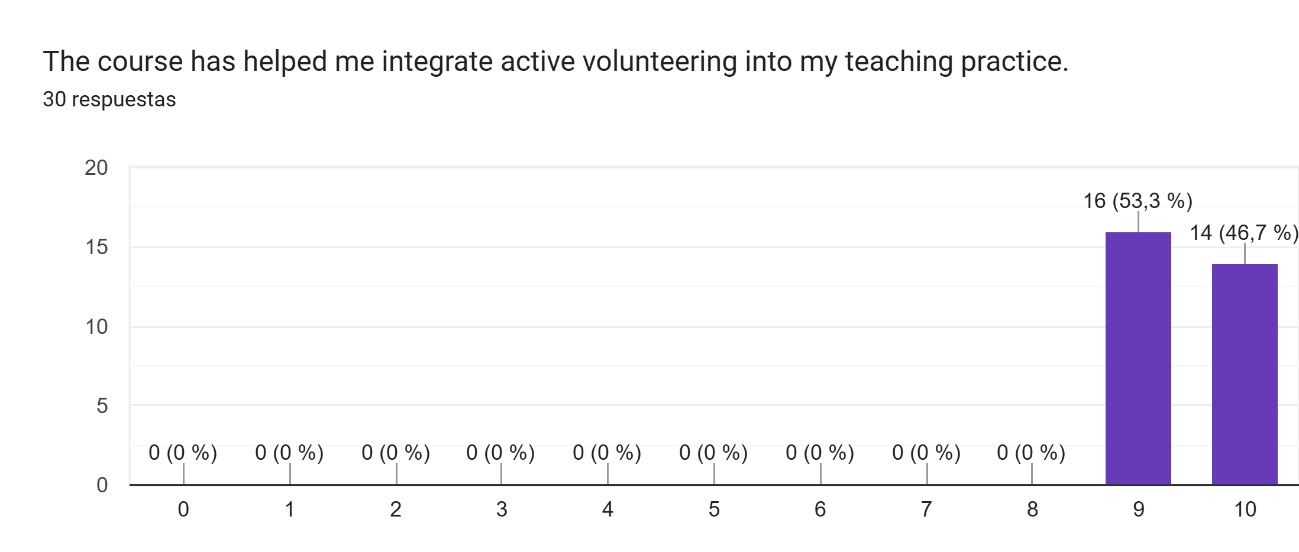
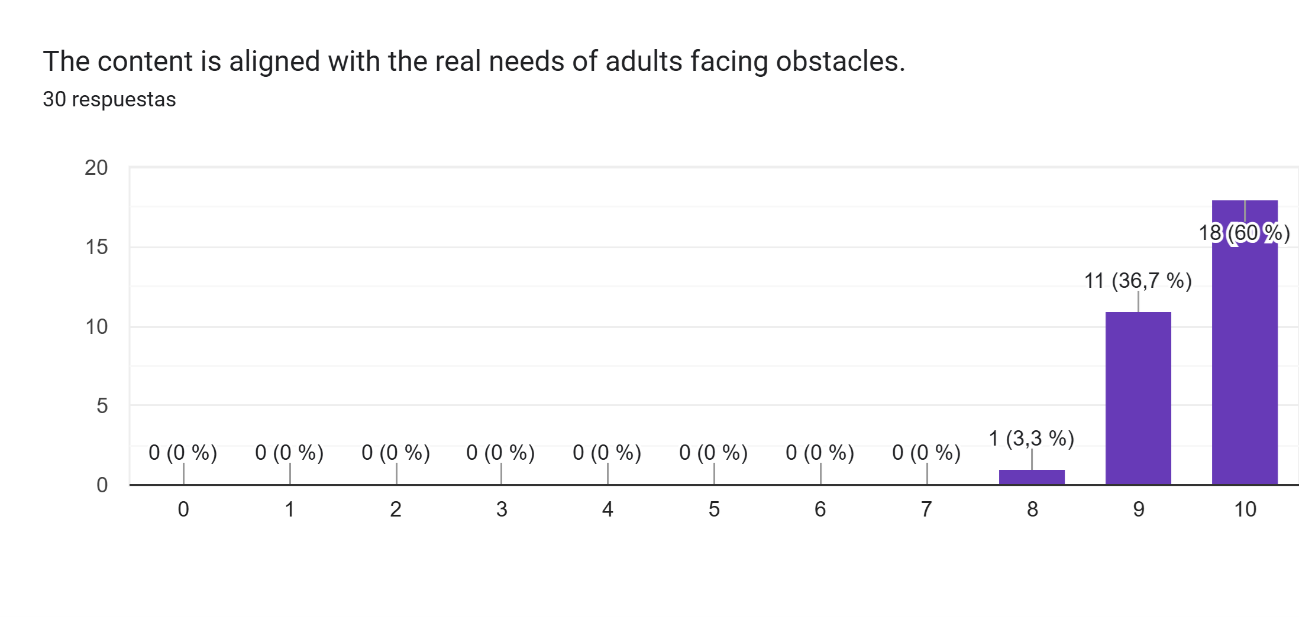
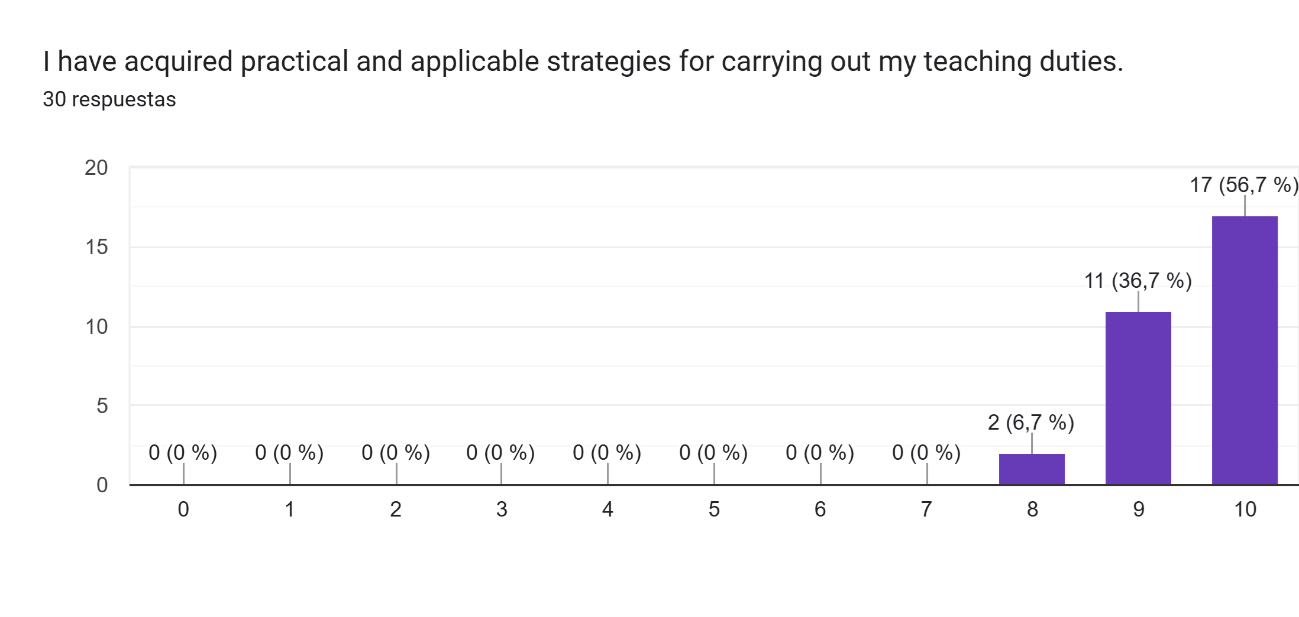
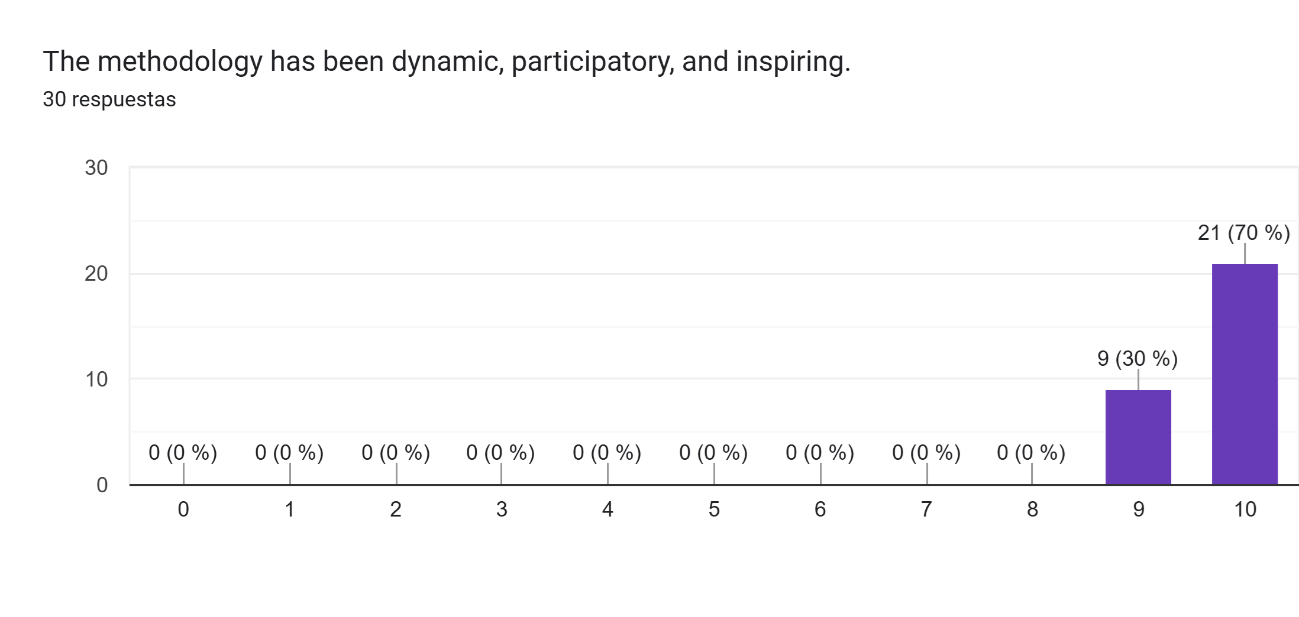
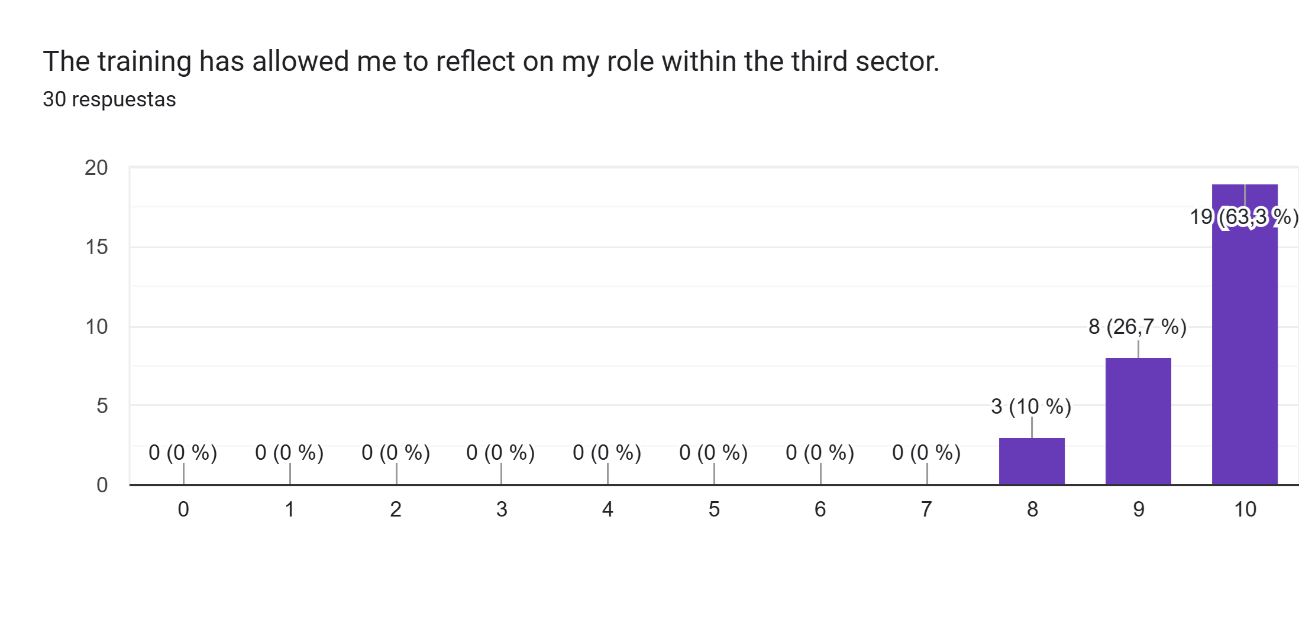
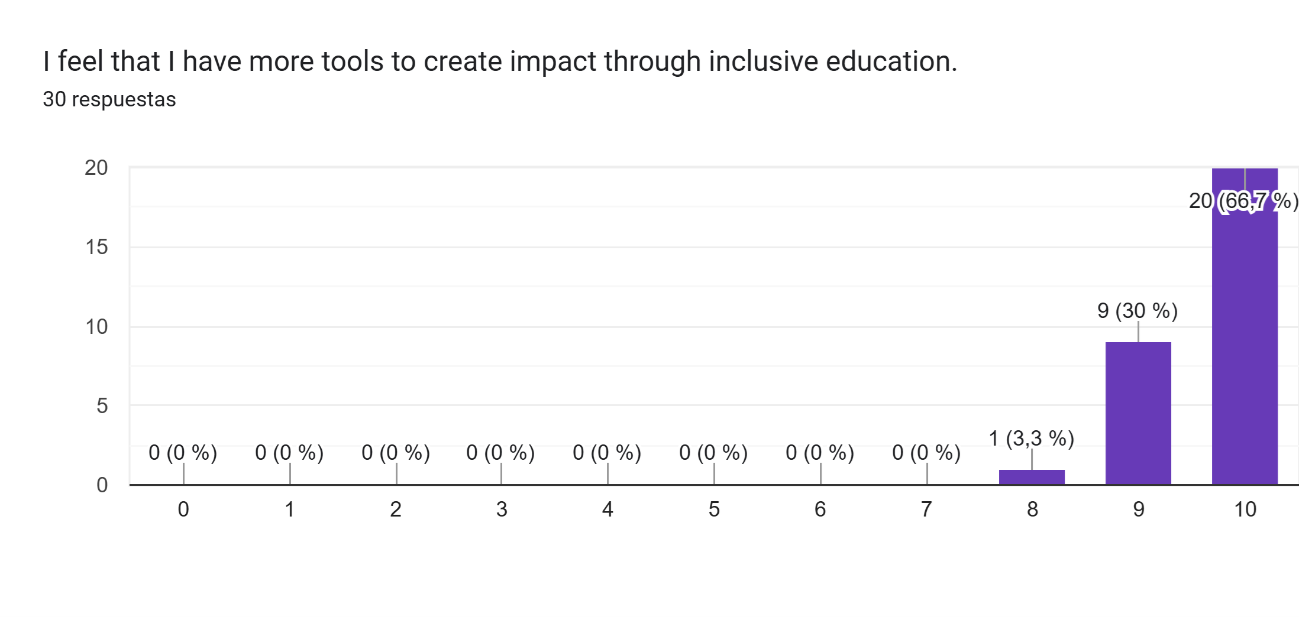
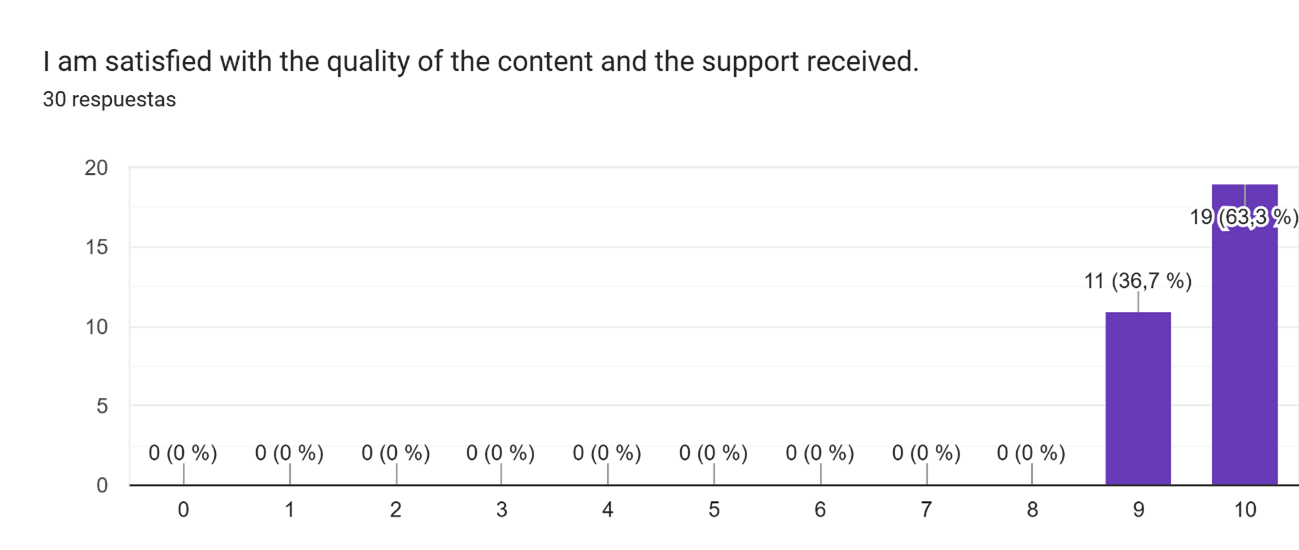
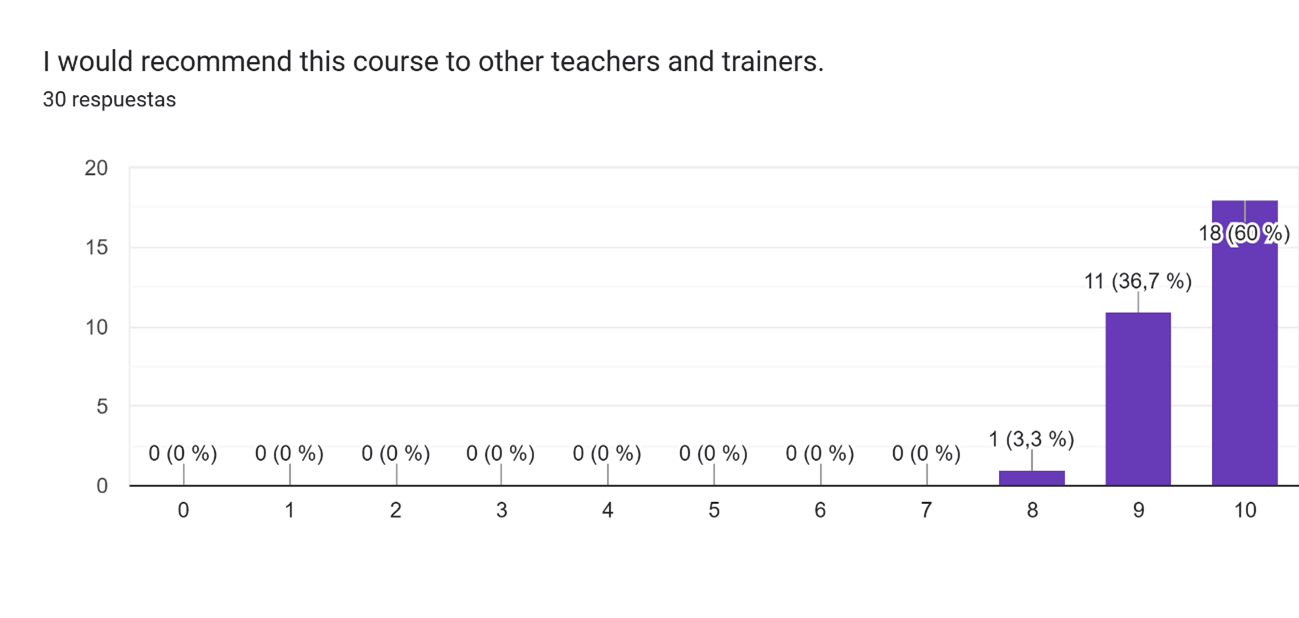
PILOT TEST O6. THE NEW E2.0C CENTER BENITA GIL
With users already logged into the platform, web traffic data was used to evaluate the most frequently used features and their progress through the center’s various spaces. A note was also taken of whether interactions with the virtual environment were organic and easy to understand. Thanks to this visualization system in the page’s internal code and user feedback on various navigability issues, small adjustments were made to improve the experience (such as more visible and eye-catching buttons, traditional access for groups of users with communication difficulties in the environment, grouping of certain content, among other minor tweaks), and the design was finally implemented.
Participants: Adults between the ages of 18 and 54, especially between 18 and 30, who are outside the school system, without a degree, and/or in situations of social exclusion, with the aim of validating the project’s impact in real-life settings.
Results of the pilot test:
The evaluation of the O6 survey has yielded remarkably positive results, demonstrating high participant satisfaction. Of the 20 surveys conducted, we found that the average score exceeded 9 out of 10 in all cases, reflecting an exceptionally positive assessment across all the aspects we evaluated. The standard deviations, ranging from 0.41 to 0.82 points, are very low, indicating great homogeneity and consistency in the opinions expressed by participants. The minimum score recorded (between 8 and 9 points depending on the aspect evaluated) confirms that even the least satisfied respondents maintain a clearly favorable perception of the virtual platform. Likewise, the median score, mostly around 10 points, reaffirms that the majority of participants gave it maximum scores. Finally, the maximum score recorded across all the aspects evaluated was 10 points, corroborating the overall very favorable perception conveyed by the high level of recommendation for the virtual center.
